Spartacus Blog
The real reason why the FA banned women from playing on their grounds

England's women team created history by winning their first major women's tournament in a dramatic Euro 2022 final against Germany at Wembley yesterday. The media have been quick to point out that the Football Association had in the past made it very difficult for women's football to develop. However, the media has been unwilling to give details of what happened in 1921. This is understandable as it has relevance regarding the current cost of living crisis.
The story begins with the outbreak of the First World War. The role of women changed dramatically during the conflict. As men left jobs to fight overseas, they were replaced by women. Women also filled many jobs brought into existence by wartime needs. As a result the number of women employed increased from 3,224,600 in July, 1914 to 4,814,600 in January 1918. Nearly 200,000 women were employed in government departments. Half a million became clerical workers in private offices. Women worked as conductors on trams and buses. A quarter of a million worked on the land. The greatest increase of women workers was in engineering. Over 700,000 of these women worked in the highly dangerous munitions industry.
The women working in factories began to play football during lunch-breaks. Teams were formed and on Christmas Day in 1916, a game took place between Ulverston Munitions Girls and another group of local women. The munitionettes won 11-5. Soon afterwards, a game between munitions factories in Swansea and Newport. The Hackney Marshes National Projectile Factory formed a football team and played against other factories in London.
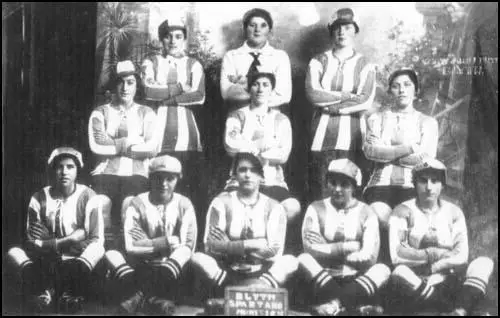
David Lloyd George, the British Prime Minister, encouraged these games as it helped reinforce the image of women doing the jobs normally done by men now needed to fight on the Western Front. This was especially important after the introduction of conscription in 1916. These matches also helped to raise money for wartime charities.
Alfred Frankland worked in the offices of the Dick, Kerr factory in Preston. During the First World War the company produced locomotives, cable drums, pontoon bridges, cartridge boxes and munitions. By 1917 it was producing 30,000 shells per week. Frankland used to watch the young women workers from his office window, kicking the ball around in their dinner-breaks. Alice Norris, one of the young women who worked at the factory later recalled these games: "We used to play at shooting at the cloakroom windows. they were little square windows and if the boys beat us at putting a window through we had to buy them a packet of Woodbines, but if we beat them they had to buy us a bar of Five Boys chocolate."
Grace Sibbert eventually emerged as the leader of the women who enjoyed playing football during the dinner-breaks. Born on 13th October, 1891, Grace's husband took part in the Battle of the Somme and in 1916 had been captured by the German Army and was at the time in a POW camp. Alfred Frankland suggested to Grace Sibbert that the women should form a team and play charity matches. Sibbert liked the idea and Frankland agreed to became the manager of the team.
Frankland arranged for the women to play a game on Christmas Day 1917, in aid of the local hospital for wounded soldiers at Moor Park. Frankland persuaded Preston North End to allow the women to play the game at their ground at Deepdale. It was the first football game to be played on the ground since the Football League programme was cancelled after the outbreak of the First World War. Over 10,000 people turned up to watch the game. After paying out the considerable costs of putting on the game, Frankland was able to donate £200 to the hospital (£41,000 in today's money).
Dick Kerr's beat the Arundel Courthard Foundry, 4-0. They went onto play and defeat other factories based in Barrow-in-Furness and Bolton. The stars of the team included the captain, Alice Kell, the centre-forward, Florrie Redford, and the hard-tackling defender, Lily Jones.
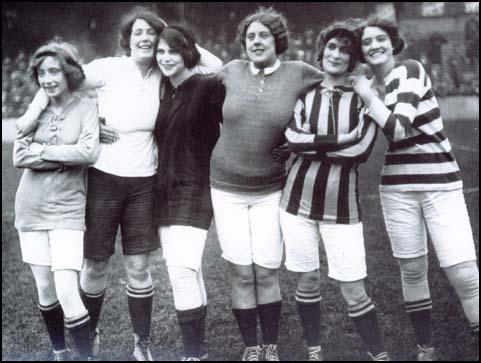
On 21st December, 1918, the team played against Lancaster Ladies at Deepdale and lost the game 1-0. Alfred Frankland was impressed with the performances of three of the women playing for Lancaster: Jennie Harris, Jessie Walmsley and Anne Hastie. Four days later, the three women had been persuaded to join the Preston side and played against Bolton Ladies on Christmas Day, 1918. Soon afterwards, another Lancaster player, Molly Walker, joined the side. Frankland also recruited players from Bolton (Florrie Haslam) and Liverpool (Daisy Clayton).
At the end of the First World War most women lost their jobs in the munitions factories. However, some retained their interest in football. For example, the Sutton Glass Works women's football team reformed as St Helens Ladies' AFC. Some teams retained the support of their employers. This included the Dick, Kerr factory in Preston.
At first men found it difficult to accept that women should play football. David J. Williamson argued in Belles of the Ball (1991): "Nor surprisingly, it was extremely difficult for many men to accept the idea of ladies playing what had always been regarded as a male preserve, their sport. Those who had been away at the front during the Great War would have had no real idea as to how the country was changing in their absence; how the role of their womenfolk within society was beginning to change quite dramatically, responding to the opportunity they had been given."
In early 1919 Dick Kerr Ladies beat St. Helens Ladies 6-1. Alfred Frankland was very impressed with the performances of Alice Woods and her fourteen year-old team-mate, Lily Parr. After the game Frankland asked the two women to join his team. Records show that Frankland paid these women 10 shillings a game. In today's money that amounted to about £100. He also paid their travelling expenses.
Women's football games were extremely popular. For example, a game between Dick Kerr Ladies and Newcastle United Ladies played at St. James's Park, in September, 1919, attracted a crowd of 35,000 people and raised £1,200 (£250,000) for local war charities.
Games were usually preceded by a laying of wreaths on the graves of local football players killed during the First World War. For example, when they played in Blackburn, they placed a wreath in remberance of Edwin Latheron, the English international inside forward who had been killed at Passchendaele.
Lily Parr was one of the main stars of the team and in her first season scored 43 goals for the club. Gail J. Newsham wrote about Parr in her book, In a League of their Own (1994): "Standing almost six feet tall, with jet black hair, her power and skill was admired and feared, wherever she played. She was an extremely unselfish player who could pin-point a pass with amazing accuracy and was also a marvellous ball player. And she was probably responsible in one way or another, for most of the goals that were scored by the team".
In 1920 a local newspaper wrote about this talented 14-year-old: "There is probably no greater football prodigy in the whole country. Not only has she speed and excellent ball control, but her admirable physique enables her to brush off challenges from defenders who tackle her. She amazes the crowd where ever she goes by the way she swings the ball clean across the goalmouth to the opposite wing."
The women came under a great deal of pressure from their families not to play football. Molly Walker was treated as an outcast by her boyfriend's family because they did not approve of her wearing shorts and showing her legs.
In 1920 Alfred Frankland arranged for the Federation des Societies Feminine Sportives de France to send a team to tour England. Madame Milliat, who had founded the federation, was a great advocate of women playing football: "In my opinion, football is not wrong for women. Most of these girls are beautiful Grecian dancers. I do not think it is unwomanly to play football as they do not play like men, they play fast, but not vigorous football."
Frankland believed that his team was good enough to represent England against a French national team. Four matches were arranged to be played at Preston, Stockport, Manchester and London. The matches were played on behalf of the National Association of Discharged and Disabled Soldiers and Sailors.
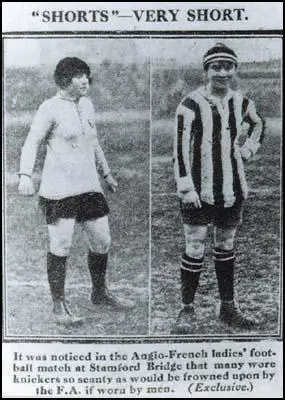
A crowd of 25,000 people turned up to the home ground of Preston North End to see the first unofficial international between England and France. England won the game 2-0 with Florrie Redford and Jennie Harris scoring the goals.
The two teams travelled to Stockport by charabanc. This time England won 5-2. The third game was played at Hyde Road, Manchester. Over 12,000 spectators saw France obtain a 1-1 draw. Madame Milliat reported that the first three games had raised £2,766 for the ex-servicemens fund.
The final game took place at Stamford Bridge, the home of Chelsea Football Club. A crowd of 10,000 saw the French Ladies win 2-1. However, the English Ladies had the excuse of playing most of the game with only ten players as Jennie Harris suffered a bad injury soon after the game started. This game caused a stir in the media when the two captains, Alice Kell and Madeline Bracquemond, kissed each other at the end of the match.
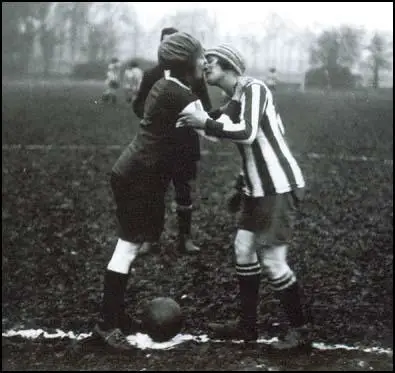
On 26th December, 1920, Dick Kerr Ladies played the second best women's team in England, St Helens Ladies, at Goodison Park, the home ground of Everton. The plan was to raise money for the Unemployed Ex Servicemens Distress Fund in Liverpool. Over 53,000 people watched the game with an estimated 14,000 disappointed fans locked outside. It was the largest crowd that had ever watched a woman's game in England.
The game at Goodison Park raised £3,115 (£623,000 in today's money). Two weeks later the Dick Kerr Ladies played a game at Old Trafford, the home of Manchester United, in order to raise money for ex-servicemen in Manchester. Over 35,000 people watched the game and £1,962 (£392,000) was raised for charity.
In 1921 the Dick Kerr Ladies team was in such demand that Alfred Frankland had to refuse 120 invitations from all over Britain. The still played 67 games that year in front of 900,000 people. It has to be remembered that all the players had full-time jobs and the games had to be played on Saturday or weekday evenings. As Alice Norris pointed out: "It was sometimes hard work when we played a match during the week because we would have to work in the morning, travel to play the match, then travel home again and be up early for work the next day."
On 14th February, 1921, 25,000 people watched Dick Kerr Ladies beat the Best of Britain, 9-1. Lily Parr (5), Florrie Redford (2) and Jennie Harris (2) got the goals. Representing their country, the Preston team beat the French national side 5-1 in front of 15,000 people at Longton. Parr scored all five goals.
1921 was very similar to the situation in the UK in 2022. During the First World War the Prime Minister, David Lloyd George, had promised that if victory was obtained the government would reward the British people. He argued during the 1918 General Election campaign that he was the "man who won the war" and he was "going to make Britain a fit country for heroes to live in."
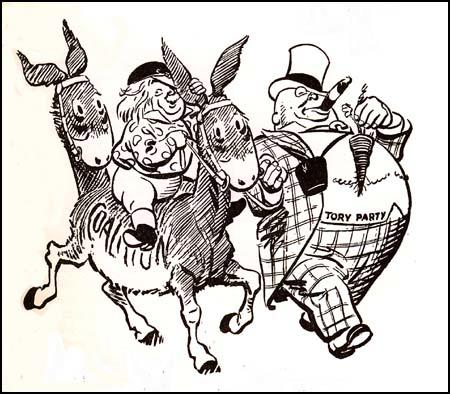
David Lloyd George lost his radical instincts in the post-war government. George Riddell wrote in his diary: "I notice that Lloyd George is steadily veering over to the Tory point of view... He says one Leverhulme (soap manufacturer) or Ellerman (shipping magnate) is worth more to the world than 10,000 sea captains or 20,000 engine drivers and should be remunerated accordingly... He wants to improve the world and the condition of the people but he wants to do it in his own way."
After the war the ending of price controls, prices rose twice as fast during 1919 as they had done during the worst years of the war. That year 35 million working days were lost to strikes, and on average every day there were 100,000 workers on strike - this was six times the 1918 rate. There were stoppages in the coal mines, in the printing industry, among transport workers, and the cotton industry. There were also mutinies in the military and two separate police strikes in London and Liverpool.
The Dick Kerr Ladies s did not only raise money for Unemployed Ex Servicemens Distress Fund. They also helped local workers who were in financial difficulty. The mining industry in particular suffered a major recession after the war. In 1920 the mine-owners notified their workers that miners' wages were to be reduced. Robert Smillie, the president of the Miners' Federation of Great Britain (MFGB) called a strike in an effort to persuade the owners to change their minds. Under the terms of the Triple Industrial Alliance, the National Union of Railwaymen (NUR) and the Transport and General Workers Union (TGWU) declared that they take industrial action in support of the miners. However, at the last moment, the leaders of the NUR and TGWU changed their minds, and although the miners went ahead with their strike they eventually had to give in and accept lower wages.
In March, 1921, the mine-owners announced a further 50% reduction in miner's wages. When the miners refused to accept this pay-cut, they were locked out from their jobs. On April 1 and, immediately on the heels of this provocation, the government put into force its Emergency Powers Act, drafting soldiers into the coalfield.
The government and the mine-owners attempted to starve the miners into submission. Several members of the Dick Kerr team came from mining areas like St. Helens and held strong opinions on this issue and games were played to raise money for the families of those men locked out of employment. As Barbara Jacobs pointed out in The Dick, Kerr's Ladies: "Women's football had come to be associated with charity, and had its own credibility. Now it was used as a tool to help the Labour Movement and the trade unions. It had, it could be said, become a politically dangerous sport, to those who felt the trade unions to be their enemies.... Women went out to support their menfolk, a Lancashire tradition, was causing ripples in a society which wanted women to revert to their prewar roles as set down by their masters, of keeping their place, that place being in the home and kitchen. Lancashire lasses were upsetting the social order. It wasn't acceptable."
The 1921 Miners Lock-Out caused considerable suffering in mining areas in Wales and Scotland. This was reflected by games played in Cardiff (18,000), Swansea (25,000) and Kilmarnock (15,000). Dick Kerr Ladies represented England beat Wales on two successive Saturdays. They also beat Scotland on 16th April, 1921.
The Football Association was appalled by what they considered to be women's involvement in national politics. It now began a propaganda campaign against women's football. A new rule was introduced that stated no football club in the FA should allow their ground to be used for women's football unless it was prepared to handle all the cash transactions and do the full accounting. This was an attempt to smear Alfred Frankland with financial irregularities.
On 5th December 1921, the Football Association issued the following statement:
Complaints having been made as to football being played by women, the Council feel impelled to express their strong opinion that the game of football is quite unsuitable for females and ought not to be encouraged.
Complaints have been made as to the conditions under which some of these matches have been arranged and played, and the appropriation of the receipts to other than Charitable objects.
The Council are further of the opinion that an excessive proportion of the receipts are absorbed in expenses and an inadequate percentage devoted to Charitable objects.
For these reasons the Council requests the clubs belonging to the Association refuse the use of their grounds for such matches.
This measure removed the ability of women to raise significant sums of money for charity as they were now barred from playing at all the major venues. The Football Association also announced that members were not allowed to referee or act as linesman at any women's football match.
As Suzanne Wrack has pointed out: "The FA and the political establishment were not blind to the growing popularity and success of women's football. The huge sums of money being raised were outside their jurisdiction and control. Worse still, that money was no longer being raised to support the war wounded but was being channelled into political and working-class causes – causes antithetical to the establishment."
The Dick Kerr Ladies team were shocked by this decision. Alice Kell, the captain, spoke for the other women when she said: "We play for the love of the game and we are determined to carry on. It is impossible for the working girls to afford to leave work to play matches all over the country and be the losers. I see no reason why we should not be recompensated for loss of time at work. No one ever receives more than 10 shillings per day."
Alice Norris pointed out that the women were determined to resist attempts to stop them playing football: "We just took it all in our stride but it was a terrible shock when the FA stopped us from playing on their grounds. We were all very upset but we ignored them when they said that football wasn't a suitable game for ladies to play."
As Gail J. Newsham argued In a League of their Own: "So, that was that, the axe had fallen, and despite all the ladies denials and assurances regarding finances, and their willingness to play under any conditions that the FA laid down, the decision was irreversible. The chauvinists, the medical 'experts' and the anti women's football lobby had won - their threatened male bastion was now safe."
The continued existence of women's football was under threat. As David J. Williamson pointed out in Belles of the Ball: "All the majority of lady footballers had ever wanted to do was to simply play football! Over the years since the First World War they had given so much and asked very little in return. To he accused of, in effect, dipping their fingers in the till, only left them disgusted. Now that they had been officially banned the ladies would need to do an awful lot of thinking. To merely carry on and play the game would he more a question of survival than enjoyment. To achieve this new goal the ladies would need the guts and determination they had shown thus far. All the enthusiasm for the game that had so endeared them to the thousands of spectators at the charity matches now had to he brought to bear on simply keeping the game itself alive, if that was at all possible."
Previous Posts
The real reason why the FA banned women from playing on their grounds (1st August, 2022)
The WSPU Young Hot Bloods and the Arson Campaign (26th May, 2022)
Interpretations in History (18th April, 2022)
The Student as Teacher (31st December, 2021)
History Simulations in the Classroom (30th November, 2021)
Walter Tull: Football and War Hero (20th October, 2021)
Child Labour and Freedom of the Individual (26th July, 2021)
Don Reynolds and the Assassination of John F. Kennedy (15th June, 2021)
Richard Nixon and the Conspiracy to kill George Wallace in 1972 (5th May, 2021)
The Connections between Watergate and the JFK Assassination (2nd April, 2021)
The Covid-19 Pandemic: An Outline for a Public Inquiry (4th February, 2021)
Why West Ham did not become the best team in England in the 1960s (24th December, 2000)
The Lyndon Baines Johnson Tapes and the John F. Kennedy Assassination (9th November, 2020)
It is Important we Remember the Freedom Riders (11th August, 2020)
Dominic Cummings, Niccolò Machiavelli and Joseph Goebbels (12th July, 2020)
Why so many people in the UK have died of Covid-19 (14th May, 2020)
Why the coronavirus (Covid-19) will probably kill a higher percentage of people in the UK than any other country in Europe.. (12th March, 2020 updated 17th March)
Mandy Rice Davies and Christine Keeler and the MI5 Honey-Trap (29th January, 2020)
Robert F. Kennedy was America's first assassination Conspiracy Theorist (29th November, 2019)
The Zinoviev Letter and the Russian Report: A Story of Two General Elections (24th November, 2019)
The Language of Right-wing Populism: Adolf Hitler to Boris Johnson (11th October, 2019)
The Political Philosophy of Dominic Cummings and the Funding of the Brexit Project (15th September, 2019)
What are the political lessons to learn from the Peterloo Massacre? (19th August, 2019)
Crisis in British Capitalism: Part 1: 1770-1945 (9th August, 2019)
Richard Sorge: The Greatest Spy of the 20th Century? (29th July, 2020)
The Death of Bernardo De Torres (26th May, 2019)
Gas Masks in the Second World War killed more people than they saved (9th May, 2019)
Did St Paul and St Augustine betray the teachings of Jesus? (20th April, 2019)
Stanley Baldwin and his failed attempt to modernise the Conservative Party (15th April, 2019)
The Delusions of Neville Chamberlain and Theresa May (26th February, 2019)
The statement signed by Robert F. Kennedy Jr. and Kathleen Kennedy Townsend (20th January, 2019)
Was Winston Churchill a supporter or an opponent of Fascism? (16th December, 2018)
Why Winston Churchill suffered a landslide defeat in 1945? (10th December, 2018)
The History of Freedom Speech in the UK (25th November, 2018)
Are we heading for a National government and a re-run of 1931? (19th November, 2018)
George Orwell in Spain (15th October, 2018)
Anti-Semitism in Britain today. Jeremy Corbyn and the Jewish Chronicle (23rd August, 2018)
Why was the anti-Nazi German, Gottfried von Cramm, banned from taking part at Wimbledon in 1939? (7th July, 2018)
What kind of society would we have if Evan Durbin had not died in 1948? (28th June, 2018)
The Politics of Immigration: 1945-2018 (21st May, 2018)
State Education in Crisis (27th May, 2018)
Why the decline in newspaper readership is good for democracy (18th April, 2018)
Anti-Semitism in the Labour Party (12th April, 2018)
George Osborne and the British Passport (24th March, 2018)
Boris Johnson and the 1936 Berlin Olympics (22nd March, 2018)
Donald Trump and the History of Tariffs in the United States (12th March, 2018)
Karen Horney: The Founder of Modern Feminism? (1st March, 2018)
The long record of The Daily Mail printing hate stories (19th February, 2018)
John Maynard Keynes, the Daily Mail and the Treaty of Versailles (25th January, 2018)
20 year anniversary of the Spartacus Educational website (2nd September, 2017)
The Hidden History of Ruskin College (17th August, 2017)
Underground child labour in the coal mining industry did not come to an end in 1842 (2nd August, 2017)
Raymond Asquith, killed in a war declared by his father (28th June, 2017)
History shows since it was established in 1896 the Daily Mail has been wrong about virtually every political issue. (4th June, 2017)
The House of Lords needs to be replaced with a House of the People (7th May, 2017)
100 Greatest Britons Candidate: Caroline Norton (28th March, 2017)
100 Greatest Britons Candidate: Mary Wollstonecraft (20th March, 2017)
100 Greatest Britons Candidate: Anne Knight (23rd February, 2017)
100 Greatest Britons Candidate: Elizabeth Heyrick (12th January, 2017)
100 Greatest Britons: Where are the Women? (28th December, 2016)
The Death of Liberalism: Charles and George Trevelyan (19th December, 2016)
Donald Trump and the Crisis in Capitalism (18th November, 2016)
Victor Grayson and the most surprising by-election result in British history (8th October, 2016)
Left-wing pressure groups in the Labour Party (25th September, 2016)
The Peasant's Revolt and the end of Feudalism (3rd September, 2016)
Leon Trotsky and Jeremy Corbyn's Labour Party (15th August, 2016)
Eleanor of Aquitaine, Queen of England (7th August, 2016)
The Media and Jeremy Corbyn (25th July, 2016)
Rupert Murdoch appoints a new prime minister (12th July, 2016)
George Orwell would have voted to leave the European Union (22nd June, 2016)
Is the European Union like the Roman Empire? (11th June, 2016)
Is it possible to be an objective history teacher? (18th May, 2016)
Women Levellers: The Campaign for Equality in the 1640s (12th May, 2016)
The Reichstag Fire was not a Nazi Conspiracy: Historians Interpreting the Past (12th April, 2016)
Why did Emmeline and Christabel Pankhurst join the Conservative Party? (23rd March, 2016)
Mikhail Koltsov and Boris Efimov - Political Idealism and Survival (3rd March, 2016)
Why the name Spartacus Educational? (23rd February, 2016)
Right-wing infiltration of the BBC (1st February, 2016)
Bert Trautmann, a committed Nazi who became a British hero (13th January, 2016)
Frank Foley, a Christian worth remembering at Christmas (24th December, 2015)
How did governments react to the Jewish Migration Crisis in December, 1938? (17th December, 2015)
Does going to war help the careers of politicians? (2nd December, 2015)
Art and Politics: The Work of John Heartfield (18th November, 2015)
The People we should be remembering on Remembrance Sunday (7th November, 2015)
Why Suffragette is a reactionary movie (21st October, 2015)
Volkswagen and Nazi Germany (1st October, 2015)
David Cameron's Trade Union Act and fascism in Europe (23rd September, 2015)
The problems of appearing in a BBC documentary (17th September, 2015)
Mary Tudor, the first Queen of England (12th September, 2015)
Jeremy Corbyn, the new Harold Wilson? (5th September, 2015)
Anne Boleyn in the history classroom (29th August, 2015)
Why the BBC and the Daily Mail ran a false story on anti-fascist campaigner, Cedric Belfrage (22nd August, 2015)
Women and Politics during the Reign of Henry VIII (14th July, 2015)
The Politics of Austerity (16th June, 2015)
Was Henry FitzRoy, the illegitimate son of Henry VIII, murdered? (31st May, 2015)
The long history of the Daily Mail campaigning against the interests of working people (7th May, 2015)
Nigel Farage would have been hung, drawn and quartered if he lived during the reign of Henry VIII (5th May, 2015)
Was social mobility greater under Henry VIII than it is under David Cameron? (29th April, 2015)
Why it is important to study the life and death of Margaret Cheyney in the history classroom (15th April, 2015)
Is Sir Thomas More one of the 10 worst Britons in History? (6th March, 2015)
Was Henry VIII as bad as Adolf Hitler and Joseph Stalin? (12th February, 2015)
The History of Freedom of Speech (13th January, 2015)
The Christmas Truce Football Game in 1914 (24th December, 2014)
The Anglocentric and Sexist misrepresentation of historical facts in The Imitation Game (2nd December, 2014)
The Secret Files of James Jesus Angleton (12th November, 2014)
Ben Bradlee and the Death of Mary Pinchot Meyer (29th October, 2014)
Yuri Nosenko and the Warren Report (15th October, 2014)
The KGB and Martin Luther King (2nd October, 2014)
The Death of Tomás Harris (24th September, 2014)
Simulations in the Classroom (1st September, 2014)
The KGB and the JFK Assassination (21st August, 2014)
West Ham United and the First World War (4th August, 2014)
The First World War and the War Propaganda Bureau (28th July, 2014)
Interpretations in History (8th July, 2014)
Alger Hiss was not framed by the FBI (17th June, 2014)
Google, Bing and Operation Mockingbird: Part 2 (14th June, 2014)
Google, Bing and Operation Mockingbird: The CIA and Search-Engine Results (10th June, 2014)
The Student as Teacher (7th June, 2014)
Is Wikipedia under the control of political extremists? (23rd May, 2014)
Why MI5 did not want you to know about Ernest Holloway Oldham (6th May, 2014)
The Strange Death of Lev Sedov (16th April, 2014)
Why we will never discover who killed John F. Kennedy (27th March, 2014)
The KGB planned to groom Michael Straight to become President of the United States (20th March, 2014)
The Allied Plot to Kill Lenin (7th March, 2014)
Was Rasputin murdered by MI6? (24th February 2014)
Winston Churchill and Chemical Weapons (11th February, 2014)
Pete Seeger and the Media (1st February 2014)
Should history teachers use Blackadder in the classroom? (15th January 2014)
Why did the intelligence services murder Dr. Stephen Ward? (8th January 2014)
Solomon Northup and 12 Years a Slave (4th January 2014)
The Angel of Auschwitz (6th December 2013)
The Death of John F. Kennedy (23rd November 2013)
Adolf Hitler and Women (22nd November 2013)
New Evidence in the Geli Raubal Case (10th November 2013)
Murder Cases in the Classroom (6th November 2013)
Major Truman Smith and the Funding of Adolf Hitler (4th November 2013)
Unity Mitford and Adolf Hitler (30th October 2013)
Claud Cockburn and his fight against Appeasement (26th October 2013)
The Strange Case of William Wiseman (21st October 2013)
Robert Vansittart's Spy Network (17th October 2013)
British Newspaper Reporting of Appeasement and Nazi Germany (14th October 2013)
Paul Dacre, The Daily Mail and Fascism (12th October 2013)
Wallis Simpson and Nazi Germany (11th October 2013)
The Activities of MI5 (9th October 2013)
The Right Club and the Second World War (6th October 2013)
What did Paul Dacre's father do in the war? (4th October 2013)
Ralph Miliband and Lord Rothermere (2nd October 2013)

